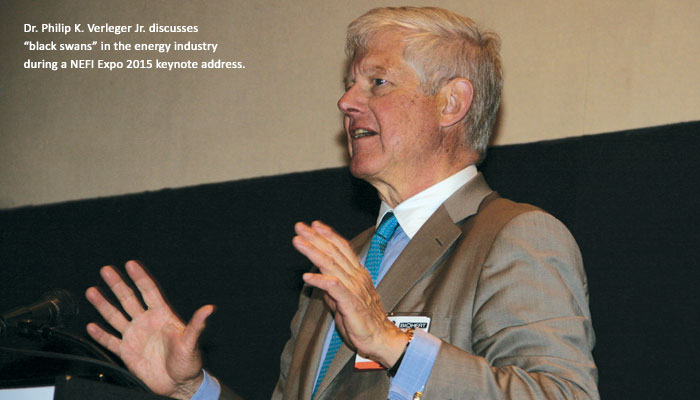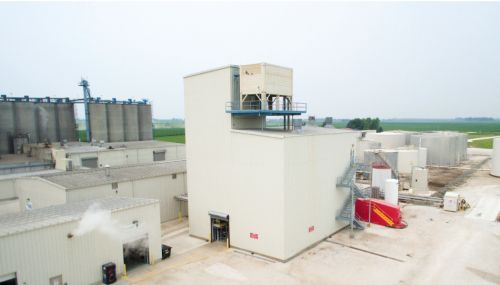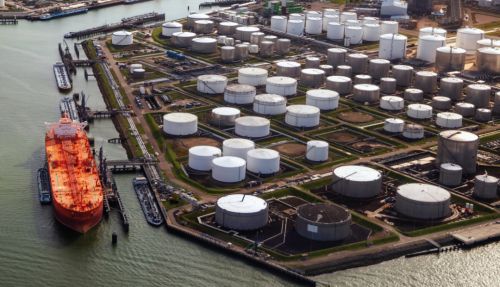All
Focus on Customers, Not Petroleum

Verleger advises marketers to watch trends and adopt new technologies
Petroleum marketers must keep a watchful eye on the horizon and anticipate the kind of unforeseen economic calamity that can catch an industry by surprise and endanger its future. That was the warning sounded by energy expert and author Dr. Philip K. Verleger Jr. in a keynote address at last month’s NEFI Expo.
In an address entitled Energy’s Future Black Swans, Verleger cited Nassim Nicholas Taleb’s 2007 bestselling book The Black Swan: The Impact of the Highly Improbable to alert the audience to risks that can emerge quickly and transform an entire industry.
Verleger, who has predicted major events such as the current U.S. energy boom, defined a black swan as an unforeseen event that is deemed improbable but causes massive consequences, either positive or negative. He quoted Saudi Arabian Oil Minister Ali Naimi as asking a discussion panel in 2014, “Is there a black swan that we don’t know about which will come by 2050 and we will have no demand?”
There are three characteristics of black swan events, according to Verleger: They are outliers that defy expectations; they have extreme impact; and they are regarded in retrospect as expected and predictable.
Black swans in nature include the San Francisco earthquake, the explosion of Mount Pinatubo and the Chicxulub asteroid strike that wiped out the dinosaurs. Black swan events caused by humans include the Great Depression, the Great Recession and the personal computer revolution. Regarding the September 11 attacks—another black swan event—Verleger said, “Nobody thought people could control a plane with box cutters and fly it into the World Trade Center.”
Fracking Is a Game Changer
He also cited several energy industry black swans, including the Arab Oil Embargo, President Jimmy Carter’s decision to ramp up coal usage in the United States, OPEC’s seizure of multinational oil company assets, and the end of the Summer-Fill Program in New England. The latter event essentially spawned the hedging industry, he said.
Now, the leadership of Saudi Arabia is facing its own black swan event. When the U.S. government undertook quantitative easing to support economic output, money flowed into fracking operations that eventually made the United States the world’s leading producer of oil and natural gas. The Organization of Petroleum Exporting Countries (OPEC) faced a huge threat to market share, and Saudi Arabia elected to maintain production levels and challenge the U.S. for market dominance.
At the same time, economy stagnation is curtailing energy demand, and fears of climate change are putting oil and other fossil fuels in the crosshairs of world leaders. Last month the leaders of the G-7 industrial nations made a non-binding pledge to phase out fossil fuels by 2100. For all these reason, Verleger said, “We might not have a market by 2040.”
Energy marketers are already facing a daunting transition, and there are more potential challenges to keep in mind, such as a global pandemic that kills millions of people or major breakthroughs in renewable energy.
Despite the assurance of Exxon Mobil CEO Rex Tillerson and others that the world needs fossil fuels, the fossil energy industry could fall prey to a black swan event. It has happened already in other major industries, according to Verleger: Executives at phone companies once believed that copper wires were the essential communications backbone, but billions of people now communicate without the benefits of wire. Large mainframe computers have also seen their market dominance destroyed by a black swan in the form of the personal computer.
Verleger cited Tesla as a company that is pushing the limits of technology while also marketing effectively and anticipating consumers’ concerns. Tesla’s electric cars faced market limitations due to “range anxiety,” so Tesla built 409 “supercharging” stations around he country where drivers can charge their Teslas in 15 minutes for free.
Be Vigilant
While Tesla is disrupting the automotive industry, there is a much more immediate threat to heating oil in the form of natural gas fracking. Verleger predicted that inexpensive natural gas would find its way into even more customers’ homes and continue to shrink heating oil’s market share.
The mindset of the Millennial generation will also work against the petroleum industry, as today’s young adults are committed to getting off oil. This does not mean that today’s energy marketing companies are doomed; they can survive as long as they transform to provide what consumers want in the years ahead. “Millennials crave comfort and convenience, and they could become great clients and customers if you offer the what they crave,” Verleger said. Verizon is a good example of a survivor, because it transitioned from a traditional phone company to a wireless provider. “Verizon moved on, and now they have brand value,” he said.
Staying committed to oil as the core product is too risky, because companies that do will become irrelevant, according to Verleger. “Your survival will require attention and aggression. Your business is to facilitate transition,” he said. “Dig into your customer base. Think of yourselves as providers of comfort and use whatever technology is around.”
Related Posts
 Why Quality Matters in Your Biofuel Blends
Why Quality Matters in Your Biofuel Blends
Posted on June 25, 2025
 Incorporating Higher Blends of Biofuels
Incorporating Higher Blends of Biofuels
Posted on May 14, 2025
 NORA Programs at Eastern Energy Expo
NORA Programs at Eastern Energy Expo
Posted on May 13, 2025
 March Short-Term Energy Outlook
March Short-Term Energy Outlook
Posted on April 28, 2025
Enter your email to receive important news and article updates.
